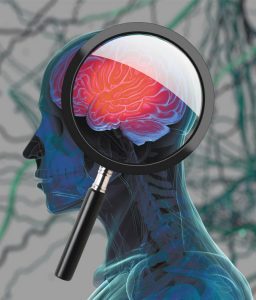By Tom Everts PA-C, IFMCP
 As the 5th leading cause of death of persons 65 years and older, Alzheimer’s disease must be on the radar for preventative action.
As the 5th leading cause of death of persons 65 years and older, Alzheimer’s disease must be on the radar for preventative action.
Last year, almost 6 million people were diagnosed with this disease, and it is estimated to triple by the year 2060. Despite these numbers, advancement in treatment has been underwhelming, to say the least. This is concerning if you have ever had a family member succumb to this disease. It is painful watching loved ones lose their memories and personality. Perhaps more painful is that signs of this disease can be present up to 10 years before the onset of symptoms.
For years the paradigm around Alzheimer’s disease suggested that amyloid plaque buildup was the cause. Turns out that the plaque is actually a defensive mechanism, your brain attempting to protect itself from injury. There are no pharmaceutical options with success at maintaining long-term stability, let alone regression of this disease. As more is uncovered, the realization is that this is a multifactorial disease process, like other chronic diseases, with similar triggers and mediators.
The risk factors for Alzheimer’s are many and include the usual: age, family history and genetics. However, there are others that aren’t commonly known. A major one is metabolic syndrome: elevated blood pressure, blood sugar, cholesterol, and obesity. This syndrome damages the vascular system, which is crucial for normal brain function and repair. Yes, repair. The brain can grow new cells. However, during this process, if the cells do not have adequate blood supply they will not thrive. The result is decreased brain size, a finding in Alzheimer’s disease. In addition, when blood sugar is not regulated appropriately one result is metabolic inflexibility, the brain’s inability to utilize other sources of energy. Another result is inflammation and insulin resistance, both major contributors to many chronic diseases, including Alzheimer’s.
Another fairly unknown risk factor for Alzheimer’s disease includes exposure to toxins. A common toxin includes mercury, which is responsible for ~4% of overall dementia cases, translating to millions of people. This comes in many forms, but especially amalgam fillings. There are countless other toxins that we are exposed to on a daily basis, from air pollution to micro-plastics and chemicals in the products we are using. If our body is unable to appropriately detoxify and eliminate them, then it must protect itself: enter amyloid plaque.
Chronic viral, bacterial and fungal infections have been linked to Alzheimer’s dementia, as well. Pathologists have found evidence of this from brain biopsies. It was once believed that the brain is sterile, but now we know that more things than we thought are able get past the blood-brain barrier. Bacteria responsible for periodontal disease have been discovered in the brain of persons with Alzheimer’s disease, further supporting the importance of good oral hygiene.
Head injuries are another risk factor that can be fairly easily prevented by wearing your seatbelt and appropriate safety gear when doing recreational activities. The future of your brain depends on it!
The approach of functional medicine is to treat the disease at the source by promoting the body’s physiology to self-correct and repair. Eating strategy, sufficient nutrients, exercise, detoxification, hormones and inflammation are just some of the areas requiring attention in order to reduce risk and treat the disease. The majority of these are improved through lifestyle modifications. This is not easy to do on your own, but when these are appropriately addressed you can actually REVERSE the signs and symptoms of Alzheimer’s disease. This has been demonstrated, in small studies, where people once debilitated by early to moderate dementia are returning to their normal lives. Their brain actually INCREASES in size. This is unheard of!
Reach out to a functional medicine provider to uncover the areas you need to focus on to optimize your health and reduce your risk of Alzheimer’s disease.
Linell King MD, renowned internist and author of “Mastering Vitality” received his medical degree from the University Of Wisconsin School Of Medicine, and completed his residency at The Johns Hopkins University Sinai Hospital Program of Internal Medicine. He has been practicing for twenty years; currently at his “Naples Vitality” office in Naples, FL.
Our practice size is limited to ensure the best possible care for our clientele; we qualify and accept patients committed to working collaboratively to create improved health and continued success.
Naples Vitality
239-465-0098
www.Naplesvitality.com
3411 Tamiami Trail N. Suite 200
Naples, FL 34103








